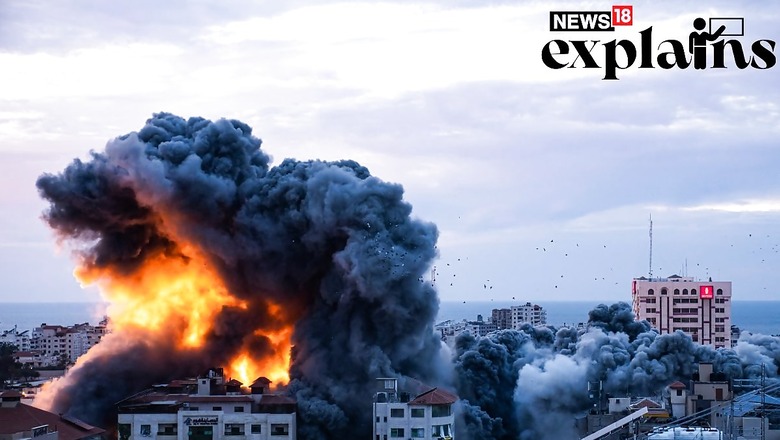
views
The unprecedented multi-pronged attack attack by Palestinian militant group Hamas on Israel’s southern flank has served a major blow to the country’s security and intelligence apparatus and resulted in huge casualties on the Israeli side.
The weekend attack by Hamas has killed more than 900 people inside Israel and also foiled peace efforts in the Middle East. Israel has meanwhile started the counteroffensive in which they have claimed to have found 1,500 bodies of Hamas militants around the Gaza Strip.
Hamas wasn’t expecting establishing their state or a military win against Israel, which has built one of the best defence system and intelligence in the world. However, the coordinated attack on Saturday seems to have crushed the Israel’s aura of invincibility and the failure of the intelligence and military is likely to haunt Israel’s policymakers for years.
Quest for Palestinian Leadership
One of the possible reasons behind the surprise attacks is that Hamas has been competing with the Palestinian Authority for the leadership of the Palestinian cause, according to a report in The Indian Express.
Hamas has differed with the Palestinian Authority on several issues including the Oslo Peace Accords. During the peace treaty in 1993, when Yasir Arafat agreed to the Accords with Israel to end the conflict, Hamas opposed the deal and launched a series of suicide bombings in Israel.
In the recent years, the Palestinian Authority has been believed to be indulged in corruption and misgovernance and accused of being complicit with Israel in the Palestinian cause.
Therefore, the trust deficit towards the Palestinian Authority leaves no doubt that the Hamas leads the Palestinian effort at liberation and self-determination.
End Saudi-Israel Normalisation Talks
The other reason is that the attack by Hamas was possible with the backing of Iran to end the normalisation talks between Israel and the Arab states, especially Saudi Arabia.
Recently, US President Joe Biden was mediating the peace talks between Saudi Arabia and Israel, which could lead to lasting peace in the Middle East. The Palestinian cause was the point of contest in the normalisation talks between the two countries.
However, with the recent attack, the normalisation talk is threatened to delay or derail the years-long, country-by-country diplomatic push by the US to improve relations between Israel and its Arab neighbours.
The normalization efforts began under former President Donald Trump’s administration and was branded as the Abraham Accords.
Once the talks would have been accomplished, it would have created a new alliance between the Gulf states and Israel and benefit Tel Aviv’s diplomacy against Iran’s “axis of resistance.” The pact would also have been a legacy-defining achievement for Biden, Netanyahu and Saudi Crown Prince Mohammed bin Salman.
Iran was clearly against the bilateral relations between Israel and Arab nations. Iranian President Ebrahim Raisi said, “We are against any bilateral relations between our regional countries and the Zionist regime.”
“We believe that the Zionist regime is intending to normalize this bilateral relations with the regional countries to create security for itself in the region,” he added.
US Secretary of State Antony Blinken said the Hamas attacks may have been driven in part by a desire to scuttle the United States’ most ambitious part of the initiative: the sealing of diplomatic relations between rivals Israel and Saudi Arabia.
Benefit to Hezbollah
While, Hamas launched the multi-pronged attack from the southern flank, Hezbollah fighters started launching missiles and mortar shells against Israel. Hezbollah said it had fired artillery shells and guided missiles at Israel, “in solidarity” with attacks launched from Gaza by its ally Hamas.
The move by Hezbollah suggested that it also wants escalation. Hezbollah has been losing grip over various segments of Lebanese society due to allegations of corruption, intervention in the Syrian conflict and the ongoing investigation into the 2020 Beirut port blast, according to The Conversation.
The move by the Lebanon-based armed group might be to rally support and escalate the situation, especially in the face of waning domestic and international support.


















Comments
0 comment